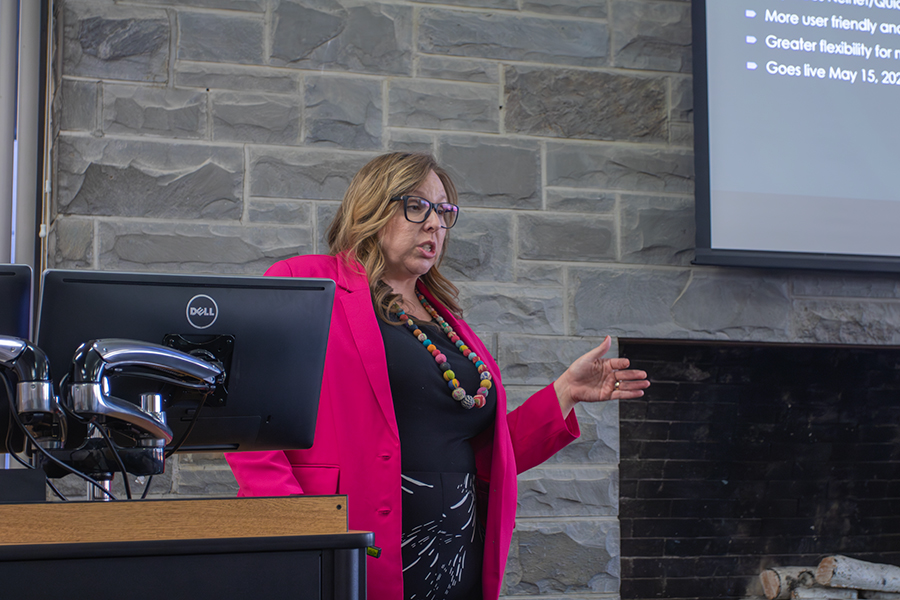The Ithaca College Student Governance Council met March 25 to hear from Shana Gore, associate vice president of enrollment operations, management and student success, about upcoming changes to the billing and payment system used for financial aid services, including a new system that will unregister students for their classes if their bill is not paid.
Gore began by explaining that the college will be switching from three payment services — Quikpay, Nelnet and 1098-T — to Transact. Gore said Transact will allow students to have easier access to their billing information. She said that switching to Transact means that students will now be able to access their bill, view their payment plans and add authorized payers all within one app.
Gore announced that the college will implement the new payment system May 15, after the spring semester ends. Gore said via email that the switch will not cost the college any additional funding, because the cost for Transact is around the same as the three services.
“I wanted to share with [the council] to get the information from you about how we can make sure that we communicate this as best as possible to students,” Gore said.
Gore then explained a few of the differences between the platforms. She said the efficiency of paying online has been improved compared to the system of paying through Quikpay, Nelnet and 1098-T.
“[Currently,] we don’t have a way to take electronic payments from someone other than the student through your portal,” Gore said. “You don’t want to give the outside company your login to [pay]. [Transact] would allow them if you just give them your name and ID [and then] they can go in and make payments to [the college] on your behalf.”
Gore said that despite the payment system changing, everything is virtually still the same in terms of payment processes and due dates.
“Everything on the old system will be migrated over,” Gore said. “You’ll be able to see your previous history there. It will look different, it won’t be the same format. It’s also helpful because we can customize the messages there. We couldn’t do that with [Quikpay].”
Gore also said the college has implemented a system that would prohibit registration for students if they have an outstanding balance of $7,000 to $10,000, to avoid any incurring costs that may occur if a student registers for classes while not having paid off their current tuition.
“And if there is not a plan in place to pay, we go ahead and remove their classes, which also [makes available] waitlist spots for students that have paid their bill on time,” Gore said. “[We will] continue to work with [students with an outstanding balance] on a solid plan.”
After explaining more about the switch in payment systems, Gore then opened up the discussion for notes the council members have for her.
Sophomore Ty Anderson, vice president of residential affairs, asked what the protocol would be if a student with an overdue balance did not communicate with financial services.
Gore said in response that when students communicate their financial situation to financial services, the majority of students can come to a resolution with the office or realize that the college is not a college they are financially compatible with.
Sophomore Rishabh Sen, vice president of campus affairs, suggested that a grace period should be introduced to make the policy sound more forgiving for students.
Gore said that there is a small grace period with the new policy. Payments are due Aug. 10 and courses will be dropped Aug. 15.
“That’s when we make the individual calls to students and their parents, emails and text messages go out,” Gore said. “It wouldn’t be until the 15th that any courses would be dropped.”
Senior Carli McConnell, president of the student body, said that a way to increase the number of students aware of this change when it is finalized is to reach out to advisers and have them make announcements.
“Reach out to the chairs of various departments so they can tell the people they are advising [to] keep an eye out for this [change] coming,” McConnell said.
First-year first-generation senator LaRon Pigford gave updates on the three bills he is working on.
Pigford said the first bill is related to making student employees more accessible for first-gen students and the second bill recommends further involvement from the New Student and Transition Programs to help accommodate first-gen, first-year and transfer students. He said the third bill addresses first-gen students within STEM majors to ensure they get the assistance they need.
Pigford said the reason why he is working on these bills is that after discussing with a friend in the physical therapy program at the college, they both concluded that STEM majors in the college should have more support.
“It’s really important that we’re supporting first-gen students, especially those that are STEM majors, double majors [or] in the dual degree program” Pigford said.
The SGC is the sole representative body for the Ithaca College student community. The SGC can be contacted at [email protected].
















